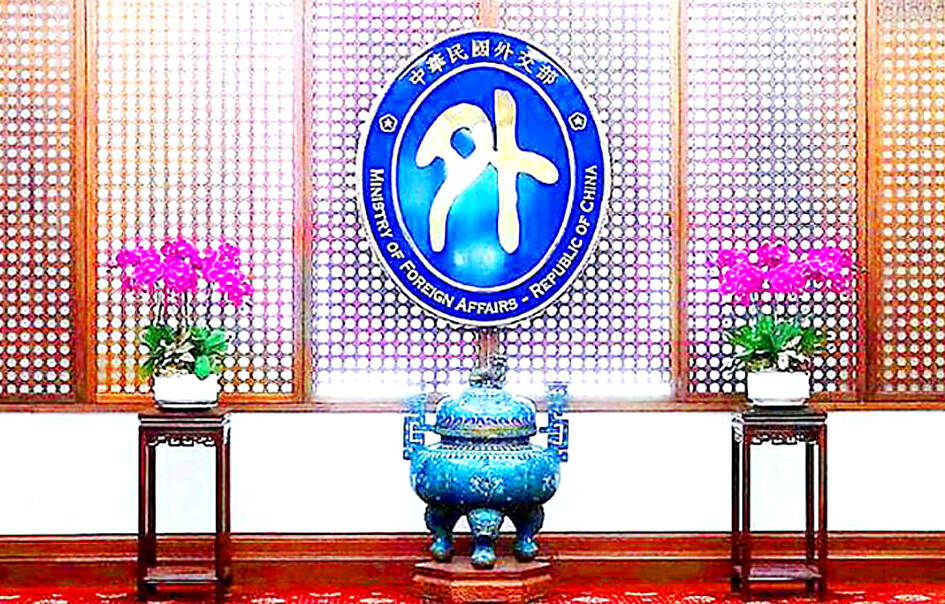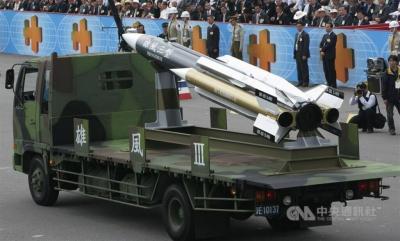Taiwan has made significant strides in tackling gender discrimination in its diplomatic sphere, but challenges, particularly the need for a shift in mindset among senior male diplomats, persist.
More women (56 percent) than men (44 percent) have been hired as diplomats by the Ministry of Foreign Affairs (MOFA) in the past two years.
Moreover, the number of female heads in the ministry far exceeds the number of men, at about 64 percent to 36 percent.

Photo: Yang Cheng-yu, Taipei Times
This trend is a stark departure from the landscape just a few decades ago.
Taiwan began to allow female applicants in national diplomacy exams in 1965, but an annual 12 percent cap on female recruits was in place, meaning only 51 became career diplomats in the nearly three decades before the rule was scrapped in 1996.
Globally, women are still underrepresented in diplomacy, a UN report said.
From 1992 to 2019, just 13 percent of negotiators, 6 percent of mediators and 6 percent of signatories in peace processes across 195 countries were women, the report showed.
Only about 25 percent of Taiwan’s top representatives in the EU and the G20 — made up of the world’s largest economies — are women.
Although the gender ratio of diplomats in Taiwan is 53.1 percent male to 46.9 percent female, men continue to dominate the top jobs, with 82 percent (91 out of 110) of overseas missions headed by male diplomats.
Of those top male envoys, 53 passed the diplomatic exam before 1996, when it was significantly harder for their female colleagues to make the cut. In recent years, there has been a noticeable improvement, boosted by measures aiming to create a more inclusive work environment.
Among them is a ministry program launched in 2005 that assigns married couples to the same representative office or embassy overseas.
This marks a shift from the past, when the ministry discouraged married couples from serving in the same location to prevent potential conflicts of interest.
The 2005 policy was designed to address the issue of female diplomats being forced to take leave or resign due to needing to relocate abroad with their spouses, the ministry said.
This is particularly relevant given the disproportionate responsibility traditionally placed on women for caring for younger children, the ministry said.
“This more family-friendly and humane policy has made it possible for diplomats to achieve a healthier work-life balance,” said a mid-level ministry official who asked to remain anonymous.
As of late 2022, 18 married couples were employed in the same overseas office, ministry data showed.
However, challenging deeply ingrained beliefs and prejudices remains a formidable task.
Taking the previous cap on admission for prospective female diplomats as an example, the ministry at the time emphasized that the policy had not been motivated by sexism or gender discrimination, but because of the “unique nature of diplomatic work” and the challenges and disadvantages that women might face in diplomatic roles, particularly in countries more hostile to them.
Persistent outdated mindsets that are particularly hostile to women working in the service who are aspiring to be, or who are already mothers, persist among senior and high- level diplomats, several sources said.
A diplomat who asked to stay anonymous said the long working hours and huge burden that come with the job create a work environment that is “extremely unfriendly” toward pregnant diplomats.
“What is even worse is that the MOFA work environment discourages pregnant women from taking maternity leave,” she said.
This might explain why even though about half of all diplomats posted overseas are women, nearly 50 percent of them are single, whereas more than 80 percent of their male counterparts are married, ministry data showed.
An unnamed male diplomat, who previously served on the ministry’s Gender Equality Committee, empathized with the challenges faced by his female colleagues, as they juggled professional responsibilities and caregiving duties.
Female diplomats often have to work extra hard and sacrifice more than their male counterparts to achieve professional success and receive recognition from senior diplomats who are predominantly men, he said.
Ultimately, an overhaul of the “bureaucratic mindset” held by those at higher levels is needed to fundamentally change the culture at MOFA, the official said.

STATS: Taiwan’s average life expectancy of 80.77 years was lower than that of Japan, Singapore and South Korea, but higher than in China, Malaysia and Indonesia Taiwan’s average life expectancy last year increased to 80.77 years, but was still not back to its pre-COVID-19 pandemic peak of 81.32 years in 2020, the Ministry of the Interior said yesterday. The average life expectancy last year increased the 0.54 years from 2023, the ministry said in a statement. For men and women, the average life expectancy last year was 77.42 years and 84.30 years respectively, up 0.48 years and 0.56 years from the previous year. Taiwan’s average life expectancy peaked at 81.32 years in 2020, as the nation was relatively unaffected by the pandemic that year. The metric

Taiwan High Speed Rail Corp. (THSRC) plans to ease strained capacity during peak hours by introducing new fare rules restricting passengers traveling without reserved seats in 2026, company Chairman Shih Che (史哲) said Wednesday. THSRC needs to tackle its capacity issue because there have been several occasions where passengers holding tickets with reserved seats did not make it onto their train in stations packed with individuals traveling without a reserved seat, Shih told reporters in a joint interview in Taipei. Non-reserved seats allow travelers maximum flexibility, but it has led to issues relating to quality of service and safety concerns, especially during

A magnitude 5.1 earthquake struck Chiayi County at 4:37pm today, the Central Weather Administration (CWA) said. The hypocenter was 36.3km southeast of Chiayi County Hall at a depth of 10.4km, CWA data showed. There were no immediate reports of damage resulting from the quake. The intensity of the quake, which gauges the actual effect of a seismic event, measured 4 in Chiayi County, Tainan and Kaohsiung on Taiwan's seven-tier intensity scale, the data showed. The quake had an intensity of 3 in Chiayi City and Yunlin County, while it was measured as 2 in Pingtung, Taitung, Hualien, Changhua, Nantou and Penghu counties, the data

The Supreme Court today rejected an appeal filed by former Air Force officer Shih Chun-cheng (史濬程), convicted of Chinese Communist Party (CCP) espionage, finalizing his sentence at two years and two months for contravening the National Security Act (國家安全法). His other ruling, a ten-month sentence for an additional contravention, was meanwhile overturned and sent to the Taichung branch of the High Court for retrial, the Supreme Court said today. Prosecutors have been notified as Shih is considered a flight risk. Shih was recruited by Chinese Communist Party (CCP) intelligence officials after his retirement in 2008 and appointed as a supervisor